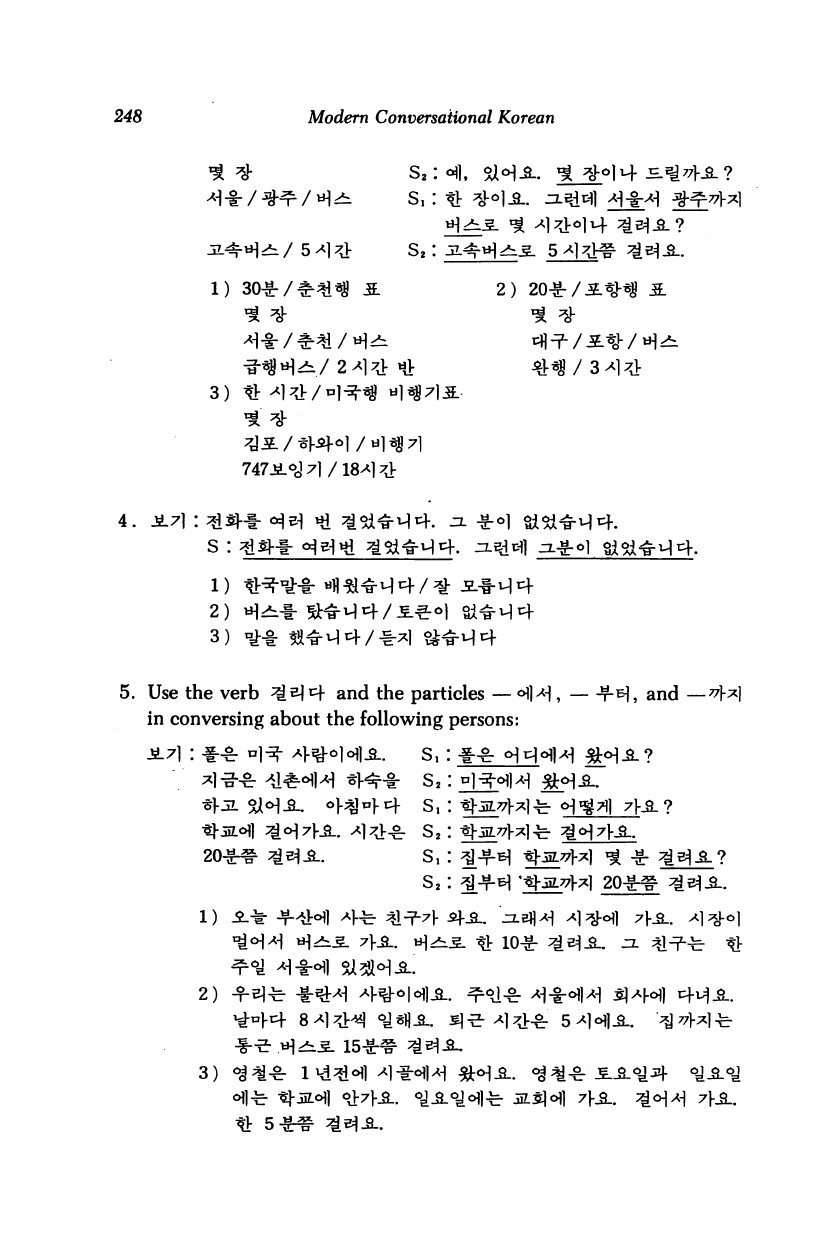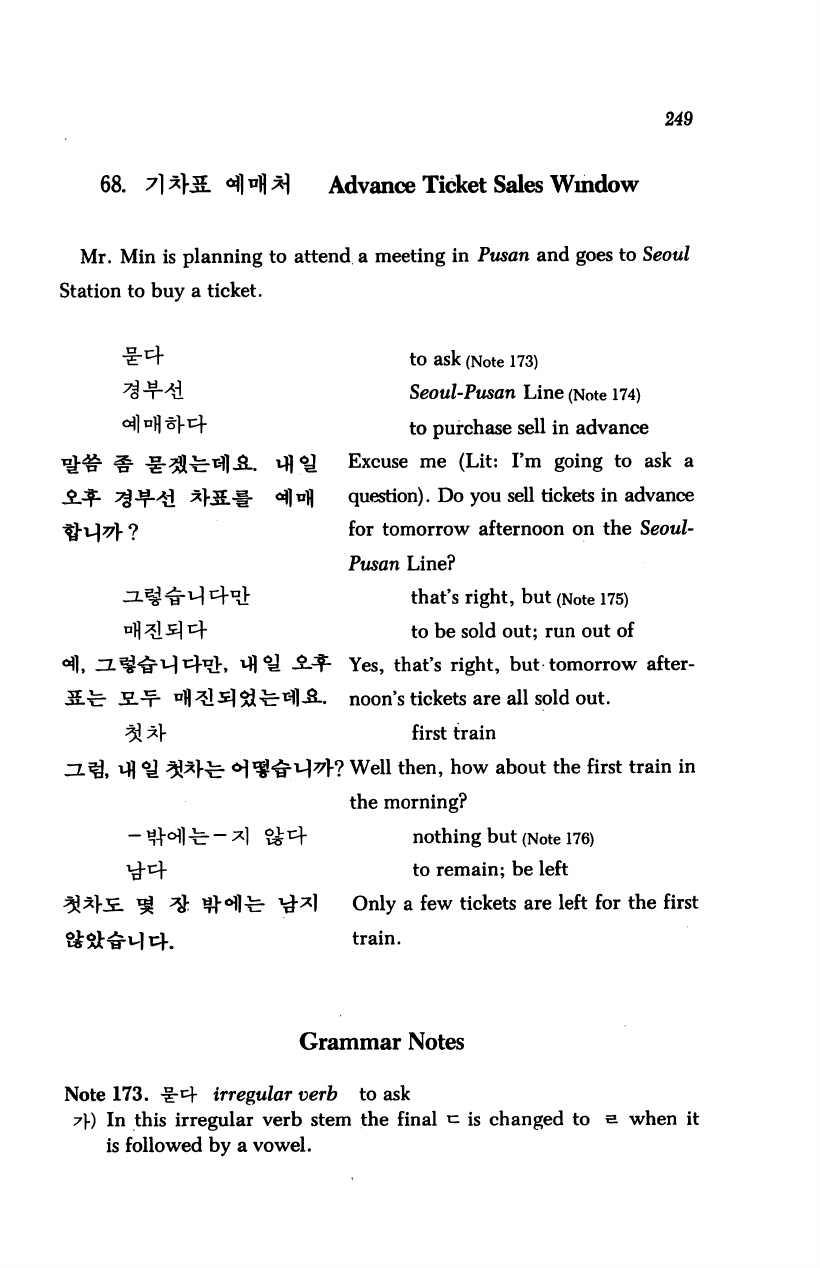Suk-in Chang. Modern Conversational Korean
Подождите немного. Документ загружается.


240
Modern
Conversational
Korean
7)
8)
9)
10)
4.
Fill
in
the
blanks
with
appropriate
words
from
among
those
given
in
the
pogi.
1)
2)
cfticMl^-fe-(
)*fl-v}i=f.
S-8:4**OI(
)♦
3)
^n^
5.
Read
the
following
sentences
and
answer
the
questions.
1)
-g-A^^-
^-SL^^l
-f
^-
2)
3)
4)
5)

241
66.
JL4f*H^tf*)*4
Express
Bus
Terminal
John
Doe
is
at
the
express
bus
terminal
on
his
first
trip
out
of
Seoul
since
he
arrived
in
Korea.
Kwangju
*]
^
^
a]
<H1
What
time
is
the
bus
for
Kwangju?
—
vfl
-3-
exclamatory
ending
(Note
165)
3.
ticket
vs^f
to
buy
20^41}
$H-S-.
^7l
10^-
There
are
buses
every
20
minutes.
The
tt)^
i*^
7>
SH1-SL.
bus
leaving
in
ten
minutes
is
over
5.1-
^^-^]
^-.
there.
Hurry and
buy
your
ticket.
—
*<8
destined
for
(Note
166)
—
Hi
number
(Note
167,168)
^
«i^fl>H
At
which
window
(Lit:
number)
do
they
sell
tickets
for
Kwangju?
a
window
7}*\)
A.
Hurry
to
window
number
5.
Grammar
Notes
Note
165.
—
vfljL
exclamatory
ending
7\)
—
vfl^.
is
similar
to
•£-.&.
(see
Lesson
47)
in
that
it
is
also
an
exclamatory
ending.
It
is
used
by
the
speaker
to
express
delight,
surprise,
or
astonishment.
M-)
The
ending
—
^\Sl
may
be
used
with
any
verb.
The
final
particle
—
.3-
is
dropped
in
the
familiar
style.
t+)
In
usage
the following
forms
appear:

242
Modern
Conversational
Korean
AVS+M1JL
DVS
+
C2-H.S-
VS
+tense
+
ifllL
Examples:
^7]
t+^-^7]-
%NliL!
-2-*
71-Sr^l
$(o.)Ml^_!
He
eats
kimchi
well!
All
the
students
are
here!
There
is
a
chipmunk!
He's/She's
feeling
good
today!
Note
166.
—
38
(ff)
weak
noun
to
be
bound
for;
be
destined
7})
The
basic
meaning
of
the
Chinese-derived
^
is
a
line
or
row,
but
it is
used
idiomatically
in
many
words
pertaining
to
travel
and/or
movement.
1)
°i*S
atrip
2)
*|-t-*8
bound
for
Seoul
behavior
-t-4*S
destined
for
Pusan
a
passer-by
administration
a
parade
Note
167.
—^.weak
noun
a
number;
a
time
(counter)
7})
Bus,
telephone,
student
and
street
numbers
are
all
designated
by
Chinese
number
+
Hi
•
Examples:
205
Hi
*H^
°JHl
°lHi
^Hi
4^
what
number,
which
number
Lotte
First
Street
bus
no.
205
no.
1
no.
2
no.
3
no.
4
Note
168.
—*&
weak
noun
a
time
(counter)
71-)
—
Hi
used
with
Korean
numerals
indicates
number
of
times
(one
has
done
something)
tt
Hi
one
time
-T-
Hi
two
times

Lesson
66
243
Hi
three
times
Hi
four
times
Hi
five
times
Hi
six
times
Hi
seven
times
°i id
Hi
eight
times
°M£-
Hi
nine
times
°|
Hi
ten
times
^
Hi
how
many
times;
several
times
M-)
Which
time
one
has
done
something
may
be
emphasized
by
—
i
Hi^
2M
_s_.
(I)
came
for
the
fifth
time.
..
It's
the
first
time
that
I've
eaten
Korean
food.
Additional
***1-
l.
2L7]:
2.
-£71:
\
3.
JL71:
4.
JL71:
Pattern
Practice
Vocabulary
an
electric
railway
^
3i
Suwon
^3-
rapidly
rf\3L
slowly
°i7j^d
t\
to
be
splendid
^-^i\
i)
20-S-
1)
3)
1)
^-^
5»rt
/10-g-/«^
30^-/15^-/
UJ:
-^1^/20
2)
^-y/^i^
^
S
I
20-§ral-t+
%t<H-9
-§r
/
^^H
^
s
:
^^
5.-1-1^-^-^
2)
<*r*l
S2:
5
Hi
^7~3-
«fr
Taej&n
Mokpo
boat
ticket
a passenger
line
mimicry;
imitation
3)
+4/7W
L.
>H
7l
10-§-^-°fl
^1
^
'
^"o"
/
>*1
^1 *H
^
3)
^1^1*1
%
Hi^l^
*o]-i.

244
Modern
Conversational
Korean
2)
)
5
»d
S,:
5»d
1)
tfl^/jL^-HA
2)
6«€
I'd
3)
6.
JL71:
^7l
H^^v
sJit+
s,:
1)
^•^-°i°l
'H^cf
2)
H^
3)
*•!
S«
2^
6*1
3*1
5.
*/H
s^

245
67.
&
^7]
Buying
A
Ticket
John
Doe
goes
to
find
window
No.
5.
to
leave,
depart
(from)
lOlr
^°fl
iriHrJ-fc-
^^33
Do
you
have
a
ticket
for
the
bus
leaving
3.7}
$H
-&-
?
for
Kwangju
in
ten
minutes?
ofl,
Sl°l-3-.
^
^"°114
Yes,
I
do.
How
many
tickets
would
you
like?
but
(Note
169)
from
(Note
170)
to
(Note
171)
take
(Note
172)
>H-§-(<Hl)>H
One
ticket
please.
How
long
does
it
take
from
Seoul
to
Kwangju
by
bus?
.
express
bus
>^.5.)
5^1
&&
^^
A.
It
takes
about
five
hours
by
bus.
Grammar
Notes
Note
169.
^.^1
conjunction
but,
however,
and,
and
yet,
such
being
the
case
7\)
jxt£3]
is
a
contraction
of
zLeitHI
.
In
actual
use
the
contracted
^2.^1^1
is
more
frequently
used.
Examples:
(I've)
called
several
times,
but
it's
always
busy.

246
Modern
Conversational
Korean
_£.*)
(He)
waited,
but
(she)
didn't
come.
(I've)
met
that
person,
but
I
don't
l-i-i:
-SL-f-i^tf.
remember
his/her
name.
Note
170.
—
c>\]a]
particle
from
7\)
—
°fl>H
is
added
to
nouns
denoting
place.
It
indicates
the
starting
point
of
movement.
Sometimes
^]
is
omitted
and
only
*\
is
used.
Examples:
14^-
n]^-ofl*|
3t<HJL
I
came
from
America.
^
6\]a]
jg*|
7}
3W-3-.
A
letter
came
from
home.
Jf>iM
3W-&-.
I
came
from
Pusan.
\\)
—
if-&\
also
indicates
movement
away
from
a
certain
place
or
time.
It
means
the
same
as
<Hl^
.
Sometimes
-^
is
added
to
<*|
(as
in—
>H-f^)
Examples:
"
from
school
. . .
•
from
SincKon
. . .
^
7]
>HJM
^1
^1^°^
-S-.
We
will
begin
from
here.
7]
cf
5i
<H
-S_.
IVe
waited
since
morning.
Note
171.
—v\x\
particle
until,
to,
by
7})
The
particle
—v\?\
preceded
by
an
expression
of
time
or
place
indicates
a
specified
time
or
place
to
which
an
action
continues.
Examples:
^■c-^H-i-^W
^M1^.
I'm
going
to
S^omZ.
o]
H^t
°\
^771-*1
7\&-
?
How
far
does
this
bus
go?
^
^17'V*1
^1-iiLoll
7^v}?
At/by
what
time
do
you
go
to
school?
<£H]77}?]
o^
7]6\] jf[A)
7$&^\77\1
How
long
will
you
be
staying
here?
9
x\
JfiH
1
^177}x]
-?-^H£_.
We
study
from
9:00
to
1:00.
H^S-
6^1^V
From
Seoul
to
Pw5an
takes
six
hours
by
bus.
Note
172.
^^4
uerft
1.
to
take
(time)
2.
to
catch
(an
illness);
be
caught
on
...
A)
This
verb
has
many
meanings,
two
of
which
are
illustrated
here.
1)
In
the
sense
of
time
required
or
time
it
takes
(to
do
something),

Lesson
67
247
the
sentence
pattern
is
noun
+
°]
/
7\
frequently
omitted.
Examples:
Q:
%
A]^
.
The
particle
is
A:
-f-
A]
A:
How
long
does
it
take?
It
takes
about
two
hours.
-Sr°l
How
long
does
it
take
to
(walk)
10-Sr°l
home?
It
takes
ten
minutes
to
(go)
home
from
school.
2)
Used
in
the
sense
of
catching
an
illness
or
getting
caught
on
something,
the
sentence
pattern
is
noun
+
<Hl
^t^^.
Examples:
Q:
*fl
71^1-8:
^Ml-S-
?
Why
are
you
coughing?
A:
7^71^1
^[sa<H-S-.
I
caught
a
cold.
Q:
sfl
tij.^17V
^o]3l°]3-
?
Why
are
your
pants
torn?
A:
^-°fl
*i!3M-3-.
I
got
caught
on
a
nail.
Pattern
Practice
Additional
Vocabulary
Hawaii
city
bus
local
train
express
train
a
public
cemetery
3)
2.
3
.
JL71
:
10-S:
/
s
:
2)
S1
:
747i°o17l
a
Boeing 747
to
walk
a
commuter
bus
to
worship
to
be
quiet
2)
71
3)

248
Modern
Conversational
Korean
s,:
s2:
1)
3)
2)
4.
s
:
2)
H^
3)
.31
nil
5.
Use
the
verb
^S^^f
and
the
particles
—
<HH,
in
conversing
about
the following
persons:
S,
S2
s,
s2
s,
—
-T-tH,
and
—
1)
2)
3)
^^-
It
10-g-
■1-5-
H^

249
68.
7}*}M.
^H*}
Advance
Ticket
Sales
Window
Mr.
Min
is
planning
to
attend
a
meeting
in
Pusan
and
goes
to
Seoul
Station
to
buy
a
ticket.
to
ask
(Note
173)
Seoul-Pusan
Line
(Note
174)
to
purchase
sell
in
advance
Excuse
me
(Lit:
I'm
going
to
ask
a
*}J3L-j[-
<^]u|)
question).
Do
you
sell
tickets
in
advance
for
tomorrow
afternoon
on
the
Seoul-
Pusan
Line?
^
that's
right,
but
(Note
175)
to
be
sold out;
run
out
of
Yes,
that's
right,
but
tomorrow
after-
JEL-t-
^fl^l^^'&^l^-.
noon's
tickets
are
all
sold
out.
3!
^f
first
train
Well
then,
how
about
the
first
train
in
the
morning?
nothing
but
(Note
176)
to
remain;
be
left
Only
a
few
tickets
are
left
for
the
first
train.
Grammar
Notes
Note
173.
-1-1=1-
irregular
verb
to
ask
7)-)
In
this
irregular
verb
stem
the
final
^
is
changed
to
s
when
it
is
followed
by
a
vowel.
